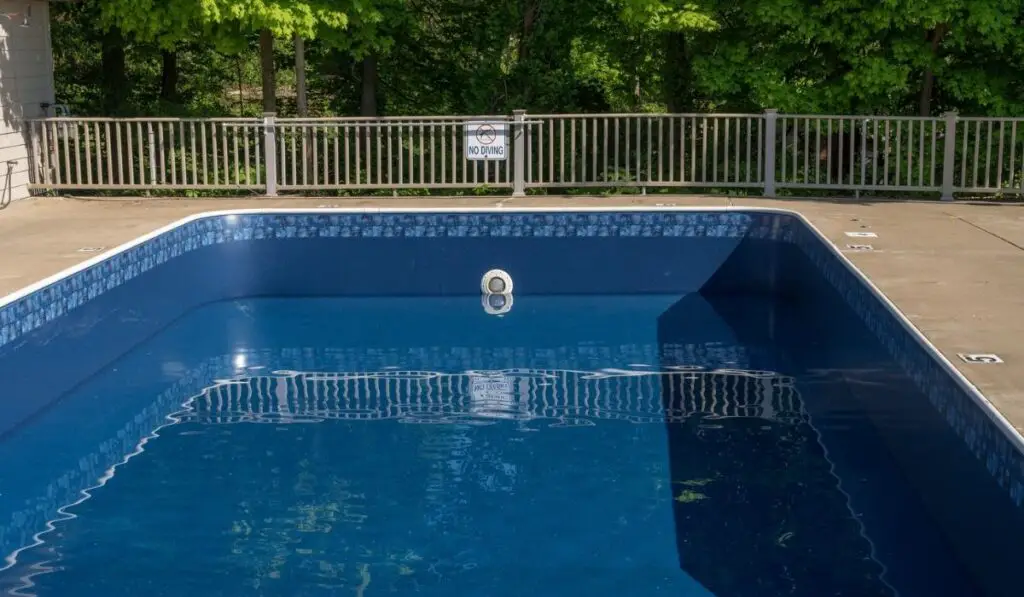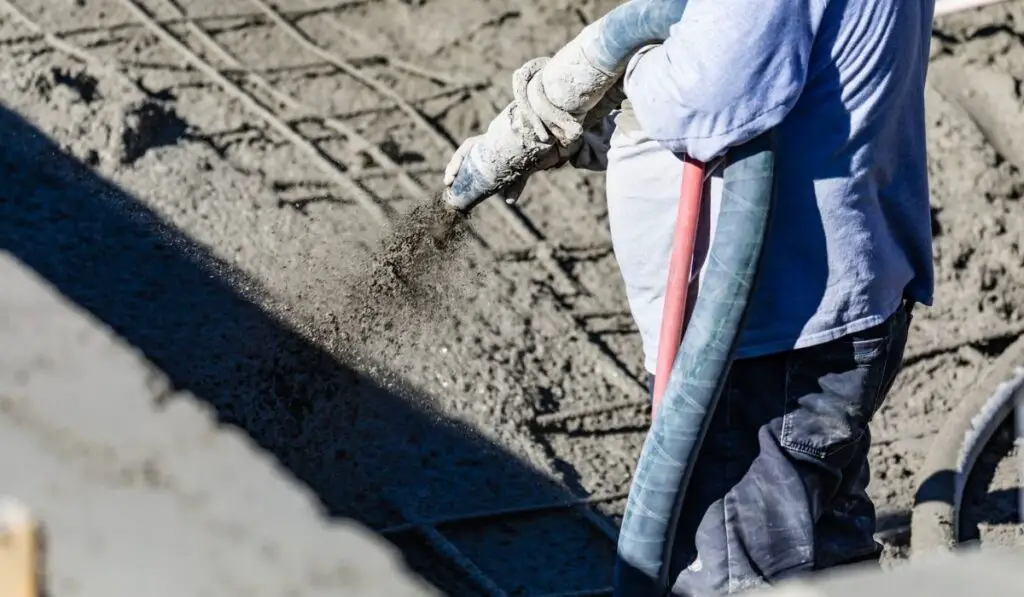A pool provides plenty of options for relaxation and entertainment. However, before making the long-term commitment to add a pool to your property, you should consider the various options on the market. Should you install a vinyl liner pool or a gunite pool? How do they differ, and which one is best for your home?
Vinyl pools are more affordable, easier to install, customizable, and relatively easy to maintain. Gunite pools, meanwhile, require more upkeep, take longer to install, and feature a rough surface. Nonetheless, gunite pools are extremely durable, lasting 3 or 4x longer than Vinyl pools.
Let’s take a closer look at these two pool structures and explore the differences that set them apart. We’ll consider the benefits and drawbacks of each so that you can make the right choice for your situation. With a purchase like a pool, all the details matter!
What Is a Vinyl Pool?

A vinyl pool is an inground swimming pool option that features a thick sheet of vinyl between the galvanized steel frame structure of the pool and the water .
A vinyl pool is comprised of five main components:
- Wall panels: Panels made of aluminum, steel or polymer make up the walls. They are typically 42 inches tall.
- Pool Base: Vermiculite or grout is applied on top of the soil to provide a smooth surface for the pool’s liner.
- Vinyl liner: A sheet of vinyl lines the pool.
- Steps: A ladder or plastic steps attached to the pool walls provides access to the pool.
- Coping: This is border between the pool and patio that spans the top perimeter of the pool. Aluminum is the standard material for coping and it’s usually painted white.
How Long Does a Vinyl Pool Last?
Vinyl pools can be built with a concrete bottom and a frame made of wood or galvanized steel. This structure can last for up to 35 years. The vinyl liner, however, has a shorter lifespan of about 5 to 9 years.
How long the liner lasts depends on several factors including exposure to sunlight, the level of care and maintenance you put into the pool, and the wear and tear sustained. With regular care and maintenance, vinyl pool liners should have a longer lifespan.
The type of liner also affects its longevity. Embossed liners that feature divots on the surface are cheaper than the flat-topped non-embossed liners but are more easily punctured. When properly installed and maintained, non-embossed liners last longer.
Are Vinyl Pools Worth It?
A strong case can be made for vinyl pools for their many advantages but there are also several drawbacks to consider.
Benefits of Vinyl Pools
- Economical: Installation costs of a vinyl pool largely depend on its size and shape. However, it remains the least expensive inground pool option available.
- Fast installation: Construction of a vinyl pool takes 2-4 weeks.
- Customization: Vinyl pools provide endless opportunities for customization in terms of the pool shape, size, depth, and design. The only limits to customization options are your imagination and the space you have to use.
- Smooth surface: Vinyl liners are smooth to the touch. Sliding over the smooth, non-abrasive surface is preferable to skinning an elbow on a concrete pool floor.
- Easy maintenance: The smooth surface of vinyl liners doesn’t allow for algae and bacterial growth. This makes maintenance much easier and cheaper.
- Higher lifetime costs: Susceptibility to damage and the need to be replaced every few years makes vinyl liners more expensive in the long run.
Drawbacks of vinyl pools
- Prone to damage: Vinyl liners are highly susceptible to damage caused by abrasion, the pressure of winter’s ice and other factors. Individual repairs may be affordable, but the costs build up over time.
- Low resale value: When selling your home, potential buyers are likely to demand replacing your pool liner as a condition of the sale, especially if it’s approaching the end of its usable life.
What Is a Gunite Pool?

Gunite is a blend of sand, cement, and water. It is a popular pool construction material and has for many years been the standard for both residential and commercial swimming pools.
This is because it’s very durable and versatile. While fiberglass and vinyl liner pools offer lower initial costs and faster installation times, they fall short when it comes to the finished product.
How Long Do Gunite Pools Last?
Gunite pools are known to have incredible durability and longevity. A steel backbone onto which the gunite is sprayed provides a strong reinforcement that can withstand water pressure at great depths.
A cement and marble dust mixture is also applied as the final coating. It not only gives the gunite pool a gleaming interior waterproof surface but also added strength and durability.
Although resistant to tensile forces, gunite pools are susceptible to surface breakdown by sunlight and pool water. Resurfacing is usually necessary to prolong their lifespan. This is usually done after 7 to 10 years.
Is a Gunite Pool Worth It?
Gunite pools could be the most common option across the country but there are both advantages and disadvantages to consider. These include:
Benefits of a Gunite Pool
- Customization: Gunite is an adaptable material that can accommodate a wide range of shapes and designs. Since gunite pools are built on-site, owners get the privilege of customizing to their needs.
- Customizable finishes: A tile or pebble finish or gunite plaster in the color of your choice allows owners to customize the pool’s finish to their liking.
- Additional features: With gunite, adding features such as built-in rock formations, waterfalls and underwater bench seating is possible.
- Diving depth: The strength of gunite and a steel backbone allows gunite pools to hold water at great depths. This is ideal for swimmers who enjoy using diving boards.
Drawbacks of a Gunite Pool
- Long construction time: To construct a gunite pool, a hole is excavated, and a network of steel bars referred to as rebar is installed. These metal rods form a cage-like frame extending throughout the entire pool.
When the steel backbone is ready, gunite is sprayed over it at high velocity through a high-pressure hose, creating a dense pool floor and walls. This may take weeks or even months to complete.
- Chemical usage: A lot of chemicals are required to clean and regulate the pool’s pH. Concrete, which is alkaline in nature, raises the pH of the pool water and hydrochloric acid must be added regularly to lower it to normal levels.
- High maintenance: The surface of gunite pools encourages algae and bacterial growth on its rough surface.
- High lifetime cost of ownership: Due to maintenance costs and pool resurfacing over the years, the lifetime cost of owning a gunite pool is significant.
- Safety concerns: The rough and hard surface of gunite pools can cause severe injuries in case of accidents.
The Verdict: Vinyl vs. Gunite
The choice between a vinyl or gunite pool comes down to personal preference. If you are working with a small installation budget, care more about comfort than design, want to protect yourself or your little ones from abrasions, and look forward to starting swimming within a few weeks, a vinyl pool is the best choice for you.
If you have a large yard and an even larger imagination, and are less concerned about cost and installation time, a gunite pool may be the perfect fit for you.
